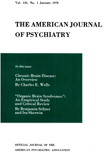Signs and symptoms as predictors of outcome: a report from the International Pilot Study of Schizophrenia
Abstract
The prognostic significance of signs and symptoms taken individually rather than in diagnostic clusters was investigated in 61 schizophrenic patients seen at 5-year follow-up in the Washington Center of the International Pilot Study of Schizophrenia. Best and worst outcome patients (Ns = 20) were selected on the basis of total outcome score from a reliable 9-item schedule; 21 middle-outcome patients were excluded. Data from these two groups were analyzed to determine which signs and symptoms assessed 5 years previously were associated with outcome. Only restricted affect predicted poor outcome: depression, anxiety, and nuclear symptoms of schizophrenia were not significant predictors. The findings are discussed within the conceptual framework of productive and defect symptoms.
Access content
To read the fulltext, please use one of the options below to sign in or purchase access.- Personal login
- Institutional Login
- Sign in via OpenAthens
- Register for access
-
Please login/register if you wish to pair your device and check access availability.
Not a subscriber?
PsychiatryOnline subscription options offer access to the DSM-5 library, books, journals, CME, and patient resources. This all-in-one virtual library provides psychiatrists and mental health professionals with key resources for diagnosis, treatment, research, and professional development.
Need more help? PsychiatryOnline Customer Service may be reached by emailing [email protected] or by calling 800-368-5777 (in the U.S.) or 703-907-7322 (outside the U.S.).



